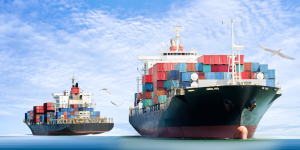The global shipping industry is undergoing a massive restructuring in 2025, with long-standing alliances dissolving and new partnerships emerging. These shifts are set to redefine carrier operations, impact freight rates, and change how businesses manage their supply chains.

The End of the 2M Alliance: A New Era for Maersk & MSC
For nearly a decade, the 2M Alliance, a strategic vessel-sharing agreement between Maersk and MSC, played a dominant role in global container shipping. This collaboration allowed both carriers to optimize network coverage, reduce operational costs, and improve service reliability.
However, in early 2025, the partnership officially dissolved, marking the end of a significant era in ocean freight. This decision was driven by:
- Diverging Business Strategies: Maersk has been shifting towards an integrated logistics model, focusing on end-to-end supply chain solutions, while MSC is doubling down on fleet expansion and independent operations.
- Market Competition & Regulatory Scrutiny: Regulators and market forces have pushed carriers to rethink traditional alliances, prompting a move toward more flexible partnerships.
- Operational Flexibility: Both companies now have greater freedom to tailor their services without being bound by alliance restrictions.
The Birth of the Gemini Cooperation: A New Powerhouse in Shipping
In response to the 2M breakup, Maersk has formed a new partnership with Hapag-Lloyd, creating the Gemini Cooperation. Unlike traditional vessel-sharing agreements, Gemini aims to build a more customer-centric and efficient shipping network, with key benefits such as:
- Improved Service Reliability – Maersk and Hapag-Lloyd plan to offer enhanced schedule integrity, which has been a major concern for global shippers.
- Streamlined Port Operations – The new network focuses on optimizing port rotations and minimizing congestion.
- Digitally Integrated Operations – Both companies are investing heavily in digital freight solutions, making cargo tracking and logistics management more seamless for customers.
This move signals a more agile and independent future for Maersk, aligning with its goal to become a fully integrated logistics provider rather than just a shipping line.
The Ocean Alliance Extension: Strengthening an Existing Giant
While Maersk and MSC have parted ways, other alliances are doubling down on their cooperation. The Ocean Alliance, composed of CMA CGM, COSCO Shipping, Evergreen, and OOCL, has extended its agreement until 2032.
This extension means:
- Continued Strength in Asia-Europe and Trans-Pacific Trade – Ocean Alliance remains a dominant force in these key lanes.
- Increased Fleet and Service Expansion – The members are pooling more vessels and expanding their service portfolios.
- Greater Market Stability – By committing to a long-term partnership, shippers can expect more predictable rates and routes.
How These Changes Impact Shippers & Supply Chains
With the restructuring of global alliances, businesses must rethink their ocean freight strategies. Here’s what to keep in mind:
- More Options, but More Complexity – As carriers form new partnerships, shippers may need to renegotiate contracts and explore alternative routing options.
- Potential Freight Rate Volatility – The dissolution of the 2M Alliance could lead to short-term rate fluctuations as Maersk and MSC establish independent pricing models.
- Stronger Focus on Service & Technology – The Gemini Cooperation and Ocean Alliance are prioritizing digitalization and efficiency, meaning supply chain managers should leverage tech-driven logistics solutions.
Implications for Shippers
These alliance shifts have several implications:
- Contract Negotiations: Trans-Pacific carriers are proposing contract rate increases of up to 25% for the 2025–26 period. However, shippers are hesitant to finalize agreements due to uncertainties surrounding tariffs and global trade dynamics.
- Market Fluidity: The restructuring has led to a dynamic environment where smaller Non-Vessel Operating Common Carriers (NVOCCs) face challenges securing contracts. Many are now collaborating with larger forwarders to ensure space and maintain service levels.
Strategic Considerations Moving Forward
Given these developments, businesses should:
- Stay Informed: Regularly monitor industry news and alliance announcements to anticipate changes that could impact supply chains.
- Diversify Partnerships: Engage with multiple carriers and forwarders to mitigate risks associated with alliance restructures and rate fluctuations.
- Adapt Contract Strategies: Be prepared for potential rate increases and consider flexible contract terms that allow adjustments based on market conditions.
In this transformative period, proactive and informed strategies are essential for navigating the complexities of global supply chains.












